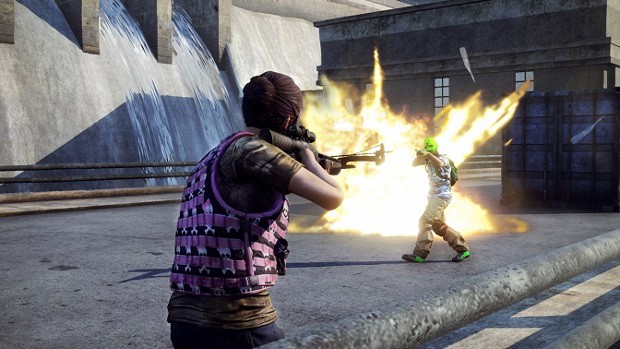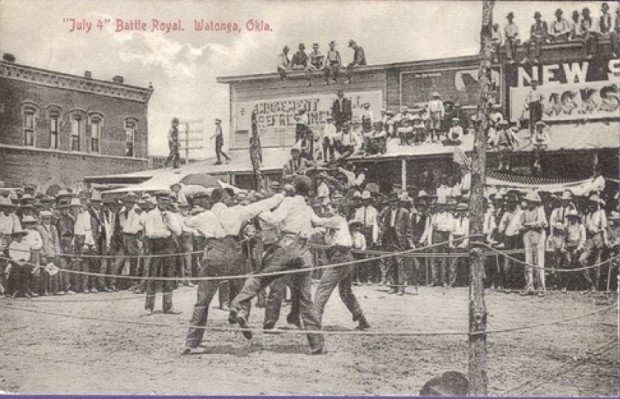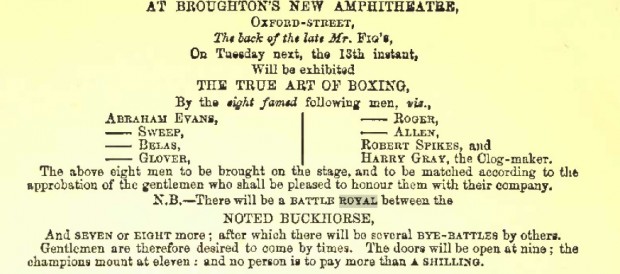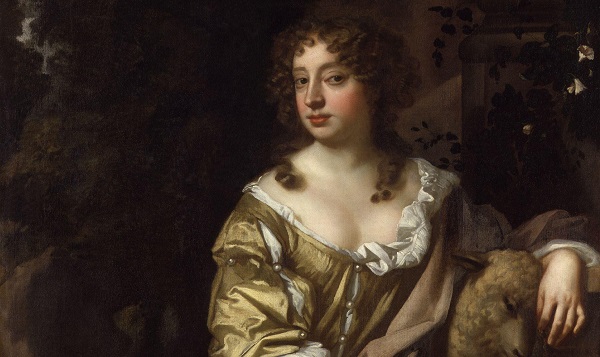The First Use Of “Battle Royale” Was Nearly 350 Years Ago, And It Didn't Involve Who You'd Expect
What was the first battle royale? No, I'm not talking about the first battle royale game, which was maybe H1Z1 or maybe a mod for DayZ or maybe an early elimination-style “death match” game. I'm wondering about the first time the term “battle royale” was used. Clearly it predates video games, so I spent some time digging around to find its origin in the English language. Suffice it to say, it came as a bit of a surprise.
Modern-day BR video games often claim to be inspired by the Japanese film and novel Battle Royale, by Koushun Takami. Those works hail from 2000 and 1999, respectively, and detail a violent contest between Japanese teenagers, forced to fight each other to the death by the government. The Hunger Games novels and movies are thought to be directly derived from Takami's works.
As a fan of professional wrestling in the 1980s, I knew for a fact that the phrase at least predated those works, but beyond that, I had no idea where it came from. The notion of adding “royal” or “royale” to a word or phrase to make it sound grander probably went back centuries, but I wanted to find out where the specific phrase “battle royale” – meaning a fighting contest between a bunch of unaffiliated contestants – got its start. The first pre-wrestling evidence I could find was pretty unpleasant.
Warning: The next section describes some shockingly racist elements of U.S. history.
A violent history
The first pre-1980s instance I found referencing a “battle royal” (no “e”) came from Ralph Ellison's 1952 novel Invisible Man – not to be confused with the science-fiction novel and movie The Invisible Man. The first chapter is titled “Battle Royal” and explains, in graphic detail, the main character's participation in a blindfolded boxing match involving 10 participants, all African-Americans, for the entertainment of the town's white gentry.
The notion of pitting a bunch of black men against each other in brutal fistfights didn't originate with Ellison and his novel. While there's some debate as to whether such bouts occurred regularly in the pre-Civil War South – slaves were valuable assets, after all, and their owners were loath to risk the health of their investments – battle royals were undoubtedly staged after the war, when the well-being of a free black man was considered to be worth far less.
This site lists mentions of several such contests in newspapers, reproducing one ad that promotes “eight heavy-weight colored pugilists in the furiously funny battle royal in barrels.” While a few African-American men, such as boxing champion Jack Johnson, used their performance in battle royals as a springboard to greater success, the vast majority of participants seemed to get nothing more for their efforts than mockery and humiliation and, occasionally, a few dollars.
At the very least, this pushes the origin of the phrase “battle royal(e)” back to the mid-19th century America. It didn't start there, however, as there's evidence of a fellow named Buckhorse participating in an eight- or nine-man contest in England on March 13, 1743:
As this article notes, boxing battle royals existed earlier in the 1700s in and around London and, oddly enough, more resembled modern professional wrestling, with “blatant fouls such like gouging” being acceptable.
So there's ample evidence of “battle royal” being a known phrase to the English around 1700, used to describe athletic contests. Pushing back further than that, however, gives us one very strange and decidedly non-sports-related entry – and the earliest use of the term I can find.
Hello, nurse(s)!
If you look at the entry for “royal” in the Online Etymology Dictionary, it states that “battle royal” hails from the 1670s. Other references I found pinpoint it as hailing from a comedy by playwright James Howard from 1672, titled “All Mistaken” or “The Mad Couple.” Noted actress of the time, Nell Gwyn (pictured above) starred in the production.
To set the scene: Philidor, a man who has just returned home from war, happens upon three nurses, with whom – if I'm reading this correctly – he has sired three children. Naturally, they all want a piece of him. It starts reasonably enough, with each nurse extolling her virtues and talking about how well she's been caring for her babe.
1 Nurse.
My young Master here is as like your
Worship, as e're he can look, has your
Tempting eyes to a hair, I cou'd not
Choose but smile to my self tother day,
I was making him clean about the
Secrets, to see what God had sent him
In a plentifull manner, it put me half
In mind of your Worship, I am sure I
Have been at double the expence of
Other Nurses in eating choice meat to
Make my milk good for my young
Master, because I wou'd not spoil the
Groath of any one of his Members.
2 Nurse.
Nay for that Neighbour, I have eat as
Good or better meat then you every day
In the week; I never toucht a bit of salt
Meat, for fear of spoyling my childs
Blood.
Philli.
Considering how well 'tis born.
3 Nurse.
Nay Neighbours for that I have been
At greater charge than either of you in
Choice dyets, to breed good milk for
My young Mistress here,
Then it gets nasty.
1 Nurse
You Lye.
2 Nurse.
You'r a Queane.
1 Nurse.
And you'r a Whore. Marry your husband
Is the notedst Cuckold in all our street.
2 Nurse.
You lye you jade yours is a greater.
Ouch. And what does Philidor dub this caustic verbal jousting?
Phili.
His—now for a battail Royal.
(Another translation I found has “Hist” as the first word. Perhaps that's an early form of “This,” which would make at least a little sense in that context.)
There you have it. The first battle royale – or “battail Royal” – involved three women fighting over a deadbeat dad. Philidor calls the children “dismall to my Eares” and their mothers “a Pack of Hounds,” “Plaguy hunting Bitches,” and “haggs have I been forc'd to Lye with.” He gets rid of them by asking his squire if the “Woolf” has been fed today. When the squire responds in the negative, he asks the lad to fetch it, and the nurses flee. Great guy, that Philidor.
In truth, the phrase might predate Howard's work. He doesn't explain it in any greater detail, which means that it could have been a term he expected viewers of his play to understand. Or, as mentioned earlier, tacking “royal(e)” on to any word might have been generally understood then as it is now, and this could truly have been the first use of the two-word term. The notion of a bunch of people fighting each other in a contest of sorts (i.e., not an actual battle in a war) dates back at least to melees in medieval tournaments, and probably well before that. Whether anyone called them “battle royal(e)s” then is anyone's guess.
But hey, maybe this could serve as inspiration for developers of future battle royales. Instead of a field that shrinks the playing area, just release an increasing number of hungry wolves. And instead of gruff soldier-men, make all the players nurses. It would be historically relevant, at least.
Related Articles
About the Author

Jason Winter is a veteran gaming journalist, he brings a wide range of experience to MMOBomb, including two years with Beckett Media where he served as the editor of the leading gaming magazine Massive Online Gamer. He has also written professionally for several gaming websites.
More Stories by Jason WinterRead Next

As Marty McFly and Captain Kirk could tell you, time travel can be messy.
You May Enjoy

Toadman Interactive takes over development.

The War Within is the MMORPG's tenth major update, featuring the start of the Worldsoul Saga.

New heroes and more as the game returns from the grave.

Is this welcomed, or too late?

💣 Feature |
5 MMORPGs That Let You Create Your Perfect World
Make your impact on the world around you.

The countdown until pre-order has begun.




Discussion (7)